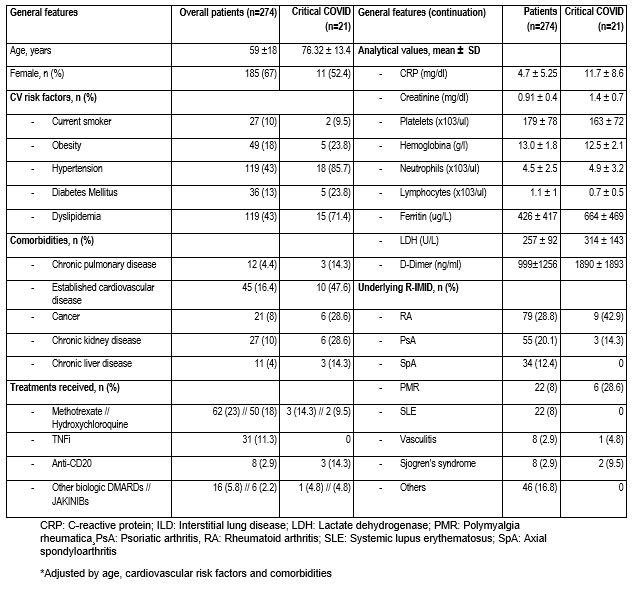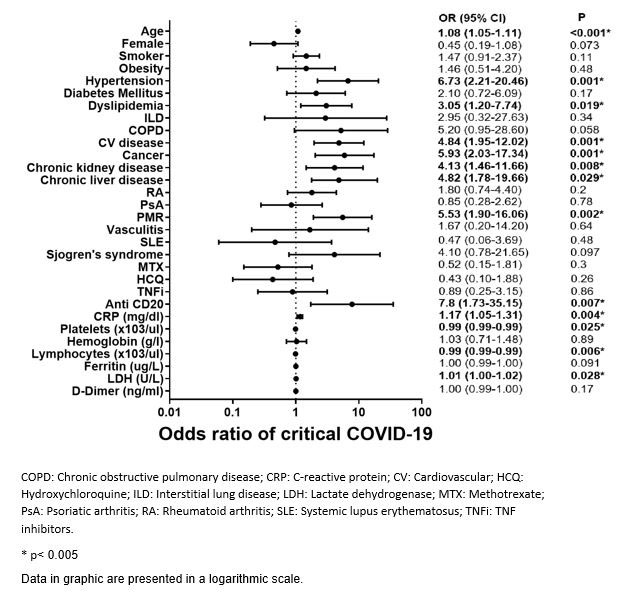Session Information
Session Type: Poster Session B
Session Time: 9:00AM-10:30AM
Background/Purpose: COVID-19 has become a common disease in patients with rheumatic immune-mediated diseases (R-IMID). A risk stratification of the patients at COVID-19 onset is important to predict possible unfavorable results.
Our aim was to identify predictive severity factors in patients with COVID-19 with R-IMID.
Methods: Cross-sectional study in a single University Hospital. We included all consecutive patients with a R-IMID and COVID-19 up to November 6th, 2020. Confirmed infection was defined if the patient had a positive nasopharyngeal swab for SARS-CoV-2.
COVID-19 case severity was divided into mild, moderate, severe and critical according to the United States National Institute of Health (NIH) COVID-19 guidelines.
We performed a multivariable analysis and calculated de odds ratio of critical COVID in patients with R-IMID, adjusting by age, sex and comorbidities.
Results: We included 274 patients with R-IMID complicated with COVID-19. At COVID-19 onset, the main comorbidities, analytical values, underlying R-IMID and treatments received are shown in TABLE.
According to COVID-19 severity, patients were mild (n=209; 76.3%), moderate (n=35; 12.8%), severe (n=9; 3.3%) and critical (n=21; 7.7%).
The predictive variables at COVID-19 onset related statistically to critical COVID were older patients, hypertension, dyslipidemia, previous cardiovascular disease, cancer, chronic kidney disease, and chronic liver disease. The only underlying R-IMID and treatment was polymyalgia rheumatica and Rituximab, respectively. Regarding analytical values were higher values of C-reactive protein, LDH, platelets and lymphopenia (FIGURE).
Conclusion: We identified various factors associated with a worse prognosis of COVID-19 in patients with R-IMID. This can help to identify which patients can present a worse course of the disease at the moment of the diagnosis.
To cite this abstract in AMA style:
Martínez-López D, Ferraz Amaro I, Prieto-Peña D, Benavides Villanueva F, Corrales C, Sánchez-Bilbao L, Herrero-Morant A, Alvarez Reguera C, Trigueros-Vazquez m, Wallmann R, González-Gay M, Blanco R. Predictive Severity Factors of COVID-19 in Patients with Rheumatic Immune Mediated Diseases [abstract]. Arthritis Rheumatol. 2022; 74 (suppl 9). https://acrabstracts.org/abstract/predictive-severity-factors-of-covid-19-in-patients-with-rheumatic-immune-mediated-diseases/. Accessed .« Back to ACR Convergence 2022
ACR Meeting Abstracts - https://acrabstracts.org/abstract/predictive-severity-factors-of-covid-19-in-patients-with-rheumatic-immune-mediated-diseases/


